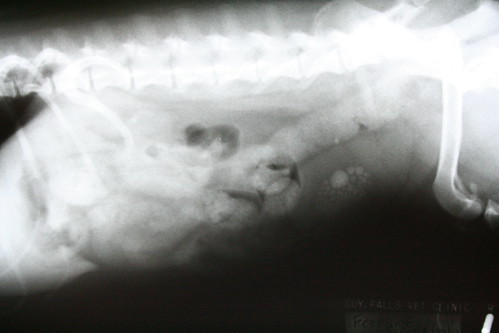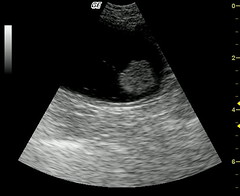Inappropriate urination. Your cat isn’t using the litter box. Or you see blood in your dog’s urine. Cleaning up messes isn’t fun, and neither is seeing your pet strain to urinate or have accidents in the house because he/she couldn’t wait to get outside. There are a variety of reasons why animals may have troubles with urination and the solution is not to simply throw medicine at the problem. Yes, medical therapy may be indicated after determining the underlying cause, but it is vital to actually determine the underlying cause of an animal’s urinary trouble.
|
Recall our blog post about the dog that had been treated over and over again as though she had a urinary tract infection. When she came to see us, and we took a radiograph of her belly, we found bladder stones. No amount of medication was going to solve her problem.
We also see many, many cats who do not use their litter boxes as they should because they’re stressed by something in their environment. It’s tempting to want to call a cat’s urinary trouble an infection, but did you know that the only way to definitively diagnose a urinary tract infection is with a culture of the urine collected in a sterile manner? Culture & Sensitivity can and should be performed for cats showing clinical symptoms and urinalysis changes on their urine samples. Obtaining a urine sample for culture is a relatively easy process that usually involves a quick visit to our clinic, and the turnaround time on the test is just over a day. If the culture is positive, antibiotic therapy is appropriate. If the culture is negative, other forms of treatment need to be considered.
|
We also see patients that develop growths or tumors within their bladder. While it is not standard protocol to perform full ultrasounds of the bladders of all animals with urinary symptoms, animals that show any degree of either resistance to treatment or repeat performances with their symptoms should have their bladders imaged with an ultrasound. Having a full, working knowledge of the bladder’s environment is key to identifying the root cause of the symptoms and developing a treatment plan to address the root cause.
When it comes to urination, our patients suffer throughout the day when their underlying disease is not treated. While it can be tempting to want to simply treat the symptoms, it is so important to find out the cause of the symptoms and treat the cause. Your pet will be thankful for your diligence and they’ll be on the road to recovery sooner than later.



